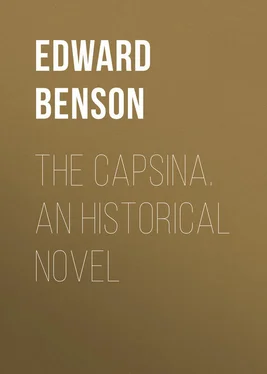Edward Benson - The Capsina. An Historical Novel
Здесь есть возможность читать онлайн «Edward Benson - The Capsina. An Historical Novel» — ознакомительный отрывок электронной книги совершенно бесплатно, а после прочтения отрывка купить полную версию. В некоторых случаях можно слушать аудио, скачать через торрент в формате fb2 и присутствует краткое содержание. Жанр: foreign_language, foreign_prose, на английском языке. Описание произведения, (предисловие) а так же отзывы посетителей доступны на портале библиотеки ЛибКат.
- Название:The Capsina. An Historical Novel
- Автор:
- Жанр:
- Год:неизвестен
- ISBN:нет данных
- Рейтинг книги:4 / 5. Голосов: 1
-
Избранное:Добавить в избранное
- Отзывы:
-
Ваша оценка:
- 80
- 1
- 2
- 3
- 4
- 5
The Capsina. An Historical Novel: краткое содержание, описание и аннотация
Предлагаем к чтению аннотацию, описание, краткое содержание или предисловие (зависит от того, что написал сам автор книги «The Capsina. An Historical Novel»). Если вы не нашли необходимую информацию о книге — напишите в комментариях, мы постараемся отыскать её.
The Capsina. An Historical Novel — читать онлайн ознакомительный отрывок
Ниже представлен текст книги, разбитый по страницам. Система сохранения места последней прочитанной страницы, позволяет с удобством читать онлайн бесплатно книгу «The Capsina. An Historical Novel», без необходимости каждый раз заново искать на чём Вы остановились. Поставьте закладку, и сможете в любой момент перейти на страницу, на которой закончили чтение.
Интервал:
Закладка:
She filled his glass again, and he sat and drank in her beauty. She seemed different in kind to what she had ever looked before – her eyes beat upon his heart, and the smile on her beautiful mouth was wine to him. He looked, weighing his courage with his chance, opened his mouth to speak, and stopped again. Truly such perturbation in the methodical Kanaris touched the portentous.
The Capsina had paused after her question, but after a moment repeated it.
"So why look farther for another and a worse?" she said again.
"Don't look farther," he said, leaning forward across the table, and twisting the sense of her question to his own use; "look nearer rather. Look nearer," he repeated; "and, oh, Capsina – "
The smile faded from her mouth but not from her eyes, for it was too deeply set therein to be disturbed by Kanaris.
"What do you mean?" she said.
"It is that I love you," said he.
But she sprang up, laughing.
"Ah, spare yourself," she said. "You ought to know I am already betrothed."
"You betrothed?"
"Yes, betrothed to the brig. No, old friend, I am not laughing at you. You honor me too much. Let us talk of something else."
Mitsos meantime was on his way back to the Capsina's betrothed. He had sailed rapidly across the bay, and made the anchorage close to the house in no longer than half an hour. His father, Constantine, had died two months ago, and since then he and Suleima had lived alone. Just now, however, Father Andréa was with them, staying a few days on his way to Corinth, where he was summoned by the revolutionists, and Mitsos, going through the garden to the house, saw him walking up and down by the fountain, smoking his chibouk.
"Ah, father," he said, "I am late, am I not? But I must be off again. I met the Capsina to-day in Nauplia, and she has offered me a place on her brig – the place Kanaris held under her, or rather with her, she says. She sails to-morrow morning. Suleima is in the house?"
"Yes, with the child, to whom the teething gives trouble. This is very sudden; but, lad, I would not stop you, nor, I think, will Suleima. Go to her, then."
Suleima had heard voices, but she was trying to persuade the baby to go to sleep, while the baby, it seemed, preferred screaming and struggling. She was walking up and down the room with it, crooning softly to it, and rocking it gently in her arms. She looked up smiling at her husband as he entered.
"I heard your voice," she said, "and I would have come out, but I could not leave the adorable one. Poor manikin, he is troubled with this teething!"
"Give me the child," said Mitsos; and the baby, interested in his own transference from one to the other, stopped crying a moment, and Mitsos bent over it.
"Oh, great one," he said; "is heaven falling, or are the angels dead, that you cry so? How will you be able to eat good meat and grow like the ash-tree, unless there are teeth to you? And how should there be teeth unless they cut through the gums – unless, like an old man, you would have us buy them for you?"
The baby ceased crying at the deep, soothing voice, and in a moment or two it was asleep.
"It is wonderful," said Suleima, taking it back from Mitsos, and laying it in the cot; "but, as you know, I have always said you were often more a woman than all the women I have ever seen."
Mitsos laughed.
"A fine big skirt should I want and a double pair of shoes," he said. "And, oh, Suleima, but it were better for the Turks I had been just a chattering woman."
"Eh, but what a husband have I got," said she, pinching his arm. "He thinks himself the grandest man of all the world. But what is there you have to tell me? – for I read you like father reads a book – there is something forward, little Mitsos."
"Yes, and indeed there is," said Mitsos, "but what with you and the child, and all this silly, daffing talk, it had gone from my mind. But this it is, most dear one, that the Capsina is here, and she has offered me the post just under her on the new ship she has built, that one you and I saw put in this morning. Eh, but it is grand for me! She will sail to-morrow."
"To-morrow! Oh, Mitsos!" Then, checking herself. "Dearest one, but your luck is still with you. She is a fine, brave lass they say, and handsome, too, and, so Dimitri told me, her ship is the fastest and best in Greece. So go, and God speed you, and I will wait, and the little one shall make haste to grow! You will stop here to-night? No? Not even to-night? Come, then, I must look out your clothes for you at once, for you must have your very best, and be a credit to the housewife."
She held Mitsos's hands for a moment, and put up her face to his to be kissed.
"Blessed be the day when first I saw you!" she whispered.
"And blessed has been every day since," said Mitsos.
"Even so, dearest," and she clung to him a moment longer. Then, "Come," she said, "we must make much haste if you are to go to-night, and indeed you shall leave behind that shirt you are wearing, to find it clean and fresh and mended when you come back. I will not have you going ragged and untidy, and oh, Mitsos, but your hair is a mop. Who has had the cutting of it? Sit you down and make no more words, and be trimmed."
Suleima got a pair of scissors, and clapping Mitsos in a chair, put the light close, and trimmed and combed out his tangled hair, with little words of reproof to him.
"Eh, but she will think you a wild man of the woods, fit only to frighten the birds from the crops. Sure, Mitsos, you will have been rubbing your head in the sand, and it was only yesterday you were scrubbing and soaping all afternoon. Well, what must be, must. Shut your eyes now and sit still," and clip went her scissors along the hair above the forehead.
"It is like cutting the pony's mane," she went on. "Such horse-hair I never saw yet. Well, the stuffing is half out of the sofa-cushion, and this will all do fine to fill it again. Now, stop laughing, lad, or an oke of hair will fall down that throat of yours, and so you will laugh never more. There, you are a little less of a scare-man. Get up and shake, and then change that shirt and trousers."
In an hour Mitsos was ready, and with a big rug on his shoulder in which his clothes were wrapped, he and Suleima set off to the little harbor below the house. The boy was going with him in order to take the boat back again, but Mitsos had sent him on ahead, and he and Suleima walked slowly down to the edge of the bay beneath a sky thick sown with stars.
"Mitsos," she said, "it will be with a heavy heart and yet a very light one that I shall say good-bye; heavy because we love one another, and yet for that reason very light. And, however far you are from me, yet you are here always in my heart, and the child is daily more like you. And, indeed, how should I love one who sat at home and went not out on these great quests? Where should I have been now, think you, oh foolish one, if you had not gone catching fish and then Turks? so do not contradict me. And oh, Mitsos, I am going to say a very foolish thing for the last. You are so dear to me that I can scarcely speak of you to others, for so I seem to share you with them; and it would please me if I thought that you too would be very sparing of my name, for so I shall feel that, as on those beautiful nights together on the bay, we enjoyed each other in secret, and none knew. And now we are come to the boat – look! – and the boy has made ready. It is very bravely that I say good-bye to you, for with my whole heart I would have you to go. Oh, most beloved!"
Конец ознакомительного фрагмента.
Текст предоставлен ООО «ЛитРес».
Прочитайте эту книгу целиком, купив полную легальную версию на ЛитРес.
Читать дальшеИнтервал:
Закладка:
Похожие книги на «The Capsina. An Historical Novel»
Представляем Вашему вниманию похожие книги на «The Capsina. An Historical Novel» списком для выбора. Мы отобрали схожую по названию и смыслу литературу в надежде предоставить читателям больше вариантов отыскать новые, интересные, ещё непрочитанные произведения.
Обсуждение, отзывы о книге «The Capsina. An Historical Novel» и просто собственные мнения читателей. Оставьте ваши комментарии, напишите, что Вы думаете о произведении, его смысле или главных героях. Укажите что конкретно понравилось, а что нет, и почему Вы так считаете.











